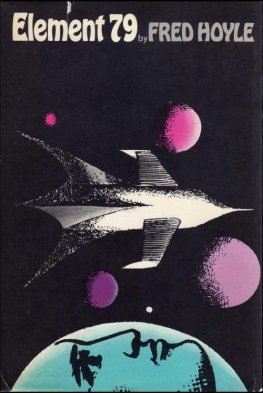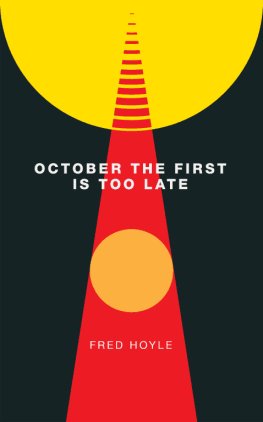Fred Hoyle - The Black Cloud
Here you can read online Fred Hoyle - The Black Cloud full text of the book (entire story) in english for free. Download pdf and epub, get meaning, cover and reviews about this ebook. year: 2010, publisher: Penguin Books, genre: Detective and thriller. Description of the work, (preface) as well as reviews are available. Best literature library LitArk.com created for fans of good reading and offers a wide selection of genres:
Romance novel
Science fiction
Adventure
Detective
Science
History
Home and family
Prose
Art
Politics
Computer
Non-fiction
Religion
Business
Children
Humor
Choose a favorite category and find really read worthwhile books. Enjoy immersion in the world of imagination, feel the emotions of the characters or learn something new for yourself, make an fascinating discovery.
- Book:The Black Cloud
- Author:
- Publisher:Penguin Books
- Genre:
- Year:2010
- Rating:3 / 5
- Favourites:Add to favourites
- Your mark:
- 60
- 1
- 2
- 3
- 4
- 5
The Black Cloud: summary, description and annotation
We offer to read an annotation, description, summary or preface (depends on what the author of the book "The Black Cloud" wrote himself). If you haven't found the necessary information about the book — write in the comments, we will try to find it.
Fred Hoyle: author's other books
Who wrote The Black Cloud? Find out the surname, the name of the author of the book and a list of all author's works by series.
The Black Cloud — read online for free the complete book (whole text) full work
Below is the text of the book, divided by pages. System saving the place of the last page read, allows you to conveniently read the book "The Black Cloud" online for free, without having to search again every time where you left off. Put a bookmark, and you can go to the page where you finished reading at any time.
Font size:
Interval:
Bookmark:
It was eight oclock along the Greenwich meridian. In England the wintry sun of 7 January 1964 was just rising. Throughout the length and breadth of the land people were shivering in ill-heated houses as they read the morning papers, ate their breakfasts, and grumbled about the weather, which, truth to tell, had been appalling of late.
The Greenwich meridian southward passes through western France over the snow-covered Pyrenees, and through the eastern corner of Spain. The line then sweeps to the west of the Balearic Islands, where wise people from the north were spending winter holidays on a beach in Minorca a laughing party might have been seen returning from an early morning bathe. And so to North Africa and the Sahara.
The primary meridian then swings towards the equator through French Sudan, Ashanti, and the Gold Coast, where new aluminium plants were going up along the Volta River. Thence into a vast stretch of ocean, unbroken until Antarctica is reached. Expeditions from a dozen nations were rubbing elbows with each other there.
All the land to the east of this line, as far as New Zealand, was turned towards the Sun. In Australia, evening was approaching. Long shadows were cast across the cricket ground at Sydney. The last overs of the day were being bowled in a match between New South Wales and Queensland. In Java, fishermen were busying themselves in preparation for the coming nights work.
Over much of the huge expanse of the Pacific, over America, and over the Atlantic it was night. It was three a.m. in New York. The city was blazing with light, and there was still a good deal of traffic in spite of recent snow and a cold wind from the northwest. And nowhere on the Earth at that moment was there more activity than in Los Angeles. The evening was well along there, midnight: the boulevards were crowded, cars raced along the freeways, restaurants were still pretty full.
A hundred and twenty miles to the south the astronomers on Palomar Mountain had already begun their nights work. But although the night was clear and stars were sparkling from horizon to zenith, conditions from the point of view of the professional astronomer were poor, the seeing was bad there was too much wind at high levels. So nobody was sorry to down tools for the midnight snack. Earlier in the evening, when the outlook for the night already looked pretty dubious, they had agreed to meet in the dome of the 48-inch Schmidt.
Paul Rogers walked the four hundred yards or so from the 200-inch telescope to the Schmidt, only to find Bert Emerson was already at work on a bowl of soup. Andy and Jim, the night assistants, were busy at the cooking stove.
Sorry I got started, said Emerson, but it looks as though tonights going to be a complete write-off.
Emerson was working on a special survey of the sky, and only good observing conditions were suitable for his work.
Bert, youre a lucky fellow. It looks as though youre going to get another early night.
Ill keep on for another hour or so. Then if theres no improvement Ill turn in.
Soup, bread and jam, sardines, and coffee, said Andy. Whatll you have?
A bowl of soup and cup of coffee, thanks, said Rogers.
Whatre you going to do on the 200-inch? Use the jiggle camera?
Yes, I can get along tonight pretty well. Theres several transfers that I want to get done.
They were interrupted by Knut Jensen, who had walked the somewhat greater distance from the 18-inch Schmidt.
He was greeted by Emerson.
Hello, Knut, theres soup, bread and jam, sardines, and Andys coffee.
I think Ill start with soup and sardines, please.
The young Norwegian, who was a bit of a leg-puller, took a bowl of cream of tomato, and proceeded to empty half a dozen sardines into it. The others looked on in astonishment.
Judas, the boy must be hungry, said Jim.
Knut looked up, apparently in some surprise.
You dont eat sardines like this? Ah, then you dont know the real way to eat sardines. Try it, youll like it.
Then having created something of an effect, he added:
I thought I smelled a skunk around just before I came in.
Should go well with that concoction youre eating, Knut, said Rogers.
When the laugh had died away, Jim asked:
Did you hear about the skunk we had a fortnight ago? He de-gassed himself near the 200-inch air intake. Before anybody could stop the pump the place was full of the stuff. It sure was some hundred per cent stink. There must have been the best part of two hundred visitors inside the dome at the time.
Lucky we dont charge for admission, chuckled Emerson, otherwise the Observatoryd be sunk in for compensation.
But unlucky for the clothes cleaners, added Rogers.
On the way back to the 18-inch Schmidt, Jensen stood listening to the wind in the trees on the north side of the mountain. Similarities to his native hills set off an irrepressible wave of homesickness, longing to be with his family again, longing to be with Greta. At twenty-four, he was in the United States on a two-year studentship. He walked on, trying to kick himself out of what he felt to be a ridiculous mood. Rationally he had no cause whatsoever to be dispirited. Everyone treated him with great kindness, and he had a job ideally suited to a beginner.
Astronomy is kind in its treatment of the beginner. There are many jobs to be done, jobs that can lead to important results but which do not require great experience. Jensens was one of these. He was searching for novae, stars that explode with uncanny violence. Within the next year he might reasonably hope to find one or two. Since there was no telling when an outburst might occur, nor where in the sky the exploding star might be situated, the only thing to do was to keep on photographing the whole sky, night after night, month after month. Some day he would strike lucky. It was true that, should he find a nova located not too far away in the depths of space, then more experienced hands than his would take over the work. Instead of the 18-inch Schmidt, the full power of the great 200-inch would then be directed to revealing the spectacular secrets of these strange stars. But at all events he would have the honour of first discovery. And the experience he was gaining in the worlds greatest observatory would stand well in his favour when he returned home there were good hopes of a job. Then he and Greta could get married. So what on earth was he worried about? He cursed himself for a fool to be unnerved by a wind on the mountainside.
By this time he had reached the hut where the little Schmidt was housed. Letting himself in, he first consulted his notebook to find the next section of the sky due to be photographed. Then he set the appropriate direction, south of the constellation of Orion: mid-winter was the only time of the year when this particular region could be reached. The next step was to start the exposure. All that remained was to wait until the alarm clock should signal its end. There was nothing to do except sit waiting in the dark, to let his mind wander where it listed.
Jensen worked through to dawn, following one exposure with another. Even so his work was not at an end. He had still to develop the plates that had accumulated during the night. This needed careful attention. A slip at this stage would lose much hard work, and was not to be thought of.
Normally he would have been spared this last exacting task. Normally he would have retired to the dormitory, slept for five or six hours, breakfasted at noon, and only then would he have tackled the developing job. But this was the end of his run. The moon was now rising in the evening, and this meant the end of observing for a fortnight, since the nova search could not be carried on during the half of the month when the moon was in the night sky it was simply that the moon gave so much light that the sensitive plates he was using would have been hopelessly fogged.
Font size:
Interval:
Bookmark:
Similar books «The Black Cloud»
Look at similar books to The Black Cloud. We have selected literature similar in name and meaning in the hope of providing readers with more options to find new, interesting, not yet read works.
Discussion, reviews of the book The Black Cloud and just readers' own opinions. Leave your comments, write what you think about the work, its meaning or the main characters. Specify what exactly you liked and what you didn't like, and why you think so.








